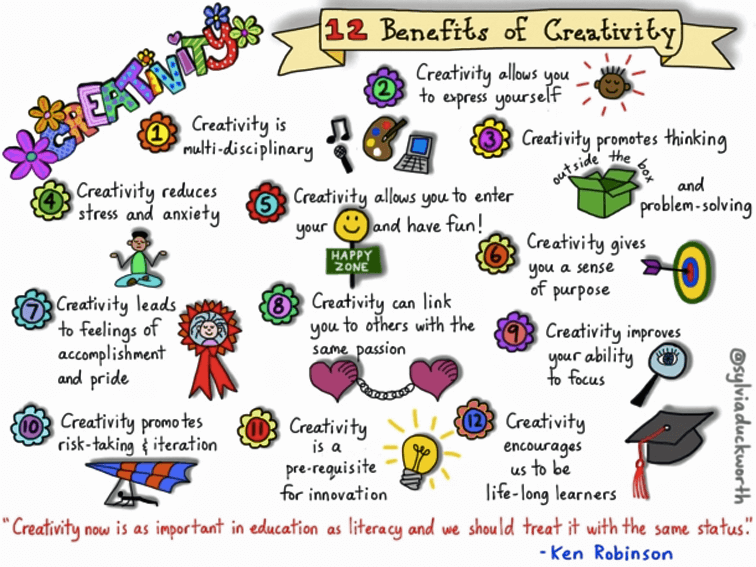
What Are The Significant Benefits Of Creativity In The Classroom?
by TeachThought Staff
Creativity is a valuable skill.
All too often people outgrow their imagination as adulthood approaches due to an encroaching sense of self-doubt, an ingrained belief that it’s an impractical pursuit, or firm guidance from more experienced grown-ups advising engineering over art school.
Although almost everyone would agree that creativity is important, budget cuts to areas of education like art and music programs demonstrate differently.
However, even those in S.T.E.M.-related fields benefit from thinking creatively. Henry Ford gave people automobiles instead of the faster horses they would have requested; Elon Musk is working on an underground tunnel system with car elevators and a hyperloop instead of improving ground transportation — efforts like these require more than technical ability; they demand imagination, creativity, and a sense of belief in the impossible.
“Without imagination and investigation of ideas our collective fund of knowledge would languish. We do need assessments to determine what students learn and understand, but we can incorporate imagination in the creation of those assessments to ensure that students’ creative thoughts and higher executive functions are incorporated into their assessment experiences,” said Dr. Judy Willis in Planning For Creativity: 4 Simple Strategies You Can Master. Creativity should be encouraged along with technical knowledge since the two go hand in hand.
And maybe more importantly, creativity infuses life with a different sort of depth and richness. As Osho said, “To be creative means to be in love with life. You can be creative only if you love life enough that you want to enhance its beauty, you want to bring a little more music to it, a little more poetry to it, a little more dance to it.”
The ripple effect of encouraging that sort of philosophy in students would be vast and broad-reaching. Creativity inspires happiness and a desire to share that with others. What’s more important than that?
Sylvia Duckworth created the following sketchnote listing 12 benefits of creativity in the classroom. An actual list would be nearly endless, but these are a great start to that conversation.
The Significant Benefits Of Creativity In The Classroom
1. Creativity is Multidisciplinary
Not only can you practice creativity through many different mediums, its benefits are applicable to almost all professions.
2. Creativity allows you to express yourself
An integral part of the human condition involves learning who we are and recognizing how that fits into the rest of the world. Creativity allows self-discovery, as well as the opportunity to share a hidden side of ourselves.
3. Creativity promotes thinking and problem-solving
From technical details of writing, drawing, or composing to the challenge of creating, problem-solving is a required component of the creative process.
4. Creativity reduces stress and anxiety
People usually pursue creative projects because they enjoy the process or the outcome. Just the act of creating inspires a sense of contentment.
5. Creativity allows you to enter your happy zone and have fun
Creativity is really another form of play, and play is universally important to each individual’s sense of joy and well-being.
6. Creativity gives you a sense of purpose
Writers, artists, and musicians often identify by those words whether they make money at their craft or not. Their creative method is their way of processing the world and a way of describing who they are.
7. Creativity can lead to feelings of accomplishment and pride
The combination of brainstorming, the technical process, and a finished process is often the perfect recipe for personal satisfaction.
8. Creativity can link you to others with the same passion
Art is important because it fosters a sense of connection and understanding of what it means to be human. A creative focus can help you find your community and feel less alone in the world.
9. Creativity improves your ability to focus
The act of creating requires dedication and commitment, not only to each individual project but to the craft itself.
10. Creativity promotes risk-taking and iteration
Making things isn’t easy; making things others will appreciate is even harder. Creativity requires courage, confidence, and the willingness to fail and try again.
11. Creativity is a prerequisite for innovation
Every advancement known to mankind started with a new idea, and new ideas are inspired by imagination and creativity.
12. Creativity encourages us to be lifelong learners
Creativity requires the humbleness to know that there’s always room for improvement and a commitment to continue challenging your ideas and ability until new growth occurs.
The Benefits Of Creativity In The Classroom
